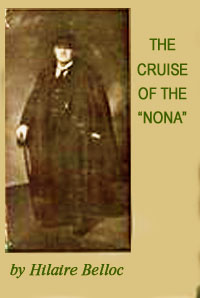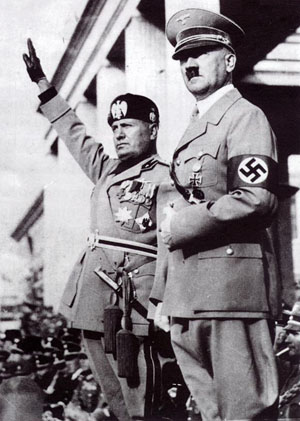 |
Socio-Political Issues
Belloc: An Admirer of Mussolini & Fascism
Patrick Odou
In 1925, at age 55, Belloc wrote The Cruise of the Nona. (1) This book combines maritime adventures on his sailboat – the Nona [Italian nickname for grandmother] – with his personal reflections and experiences. Some say that it is the closest thing to an autobiography that Belloc ever wrote.

A book proposing a Fascist program |
In this book, he manifests his enthusiasm for Italian dictator Benito Mussolini and the movement that brought him to power, Fascism. The introduction to the 1983 edition, written by Jonathan Raban, explains well the mentality of the author one will encounter upon reading this book:
“The Belloc of The Cruise of the Nona is a very different figure - a genuinely dangerous character. The book begins softly enough, in the language of romantic escapism, but by the time it has run its course it has laid down a seductive program for the regeneration of England. The program is explicitly Fascist, and the real hero of this story is Mussolini, who had come to power in Italy in 1922, three years before Belloc’s Cruise was first published. The politics and the romance of the book are intimately, powerfully twined together. It is the weirdest imaginable blend of Mein Kampf and Yachting Monthly” (Intro. p. vi).
The actual “program for the regeneration of England” is a topic for another article. The purpose of this article is to show my readers some of the enthusiasm Belloc professed for Mussolini and Fascism. This is another “concealed” side of the author to which the common reader has no access.
A pilgrimage to see Mussolini
Belloc is so enthused with Mussolini and Fascism that he travels to Rome to interview him and feels the need to describe this trip in terms of a religious experience:
“I made a sort of pilgrimage to see Mussolini, the head of the movement, and I wrote about him for the Americans. I had the honor of a long conversation with him alone, discovering and receiving his judgments. What a contrast with the sly and shifty talk of your parliamentarian!” (p. 163)

Mussolini and Hitler two dictator-clowns of the same ilk |
He could not restrain his admiration for Mussolini, and placed him above all the politicians he knew:
“What a sense of decision, of sincerity, of serving the nation, and of serving it towards a known end with a definite will! Meeting this man after talking to the parliamentarians in other countries was like meeting with some athletic friend of one’s boyhood after an afternoon with racing touts; or it was like coming upon good wine in a Pyrenean village after compulsory draughts of marsh water in the mosses of the moors above, during some long day’s travel over the range.” (p.164)
His praise is just as emphatic for Fascism. According to Belloc, Italy was “saved” by Fascism; a movement that he sees as a “fine reaction” full of “virtues”:
“Italy has done better [than other nations after World War I]: but only under the stress of a threatened dissolution. Society in Italy had to reach the point of acute peril before that reaction took place which saved the country; but what a fine reaction it was, not only in its virtues, but, what is more important, in its spirit! What a strong critical sense Italy had shown! What intelligence in rejection of sophistry, and what virility in execution! May it last! But will it last? Even in Italy? (p. 163)
He repeats this opinion of Italy being saved by Mussolini when he criticizes the modern English press:
“No newspaper here [England] either foresaw or, when it arrived, made comprehensible the Italian movement which led to the resurrection of the country by Mussolini.” (p. 268)
Soon afterward, he compliments a Continental newspaper that proposes a similar solution for England. He praises its “good, balanced judgment upon the situation with a leaning towards the English interest regarded as nearly identical with the Italian.” (p. 269)
Belloc doesn’t make a secret of his support for dictatorship and the abolition of the representative corps of States:
“The Italian [Parliament] was contemptible, and the Spanish a joke. They have both been happily kicked into the street, and I trust we shall hear of them no more.” (p.282)
“The new dictatorship in Italy, for example, when it had cleared out the Parliamentary nastiness….” (p.251)
He wishes for a continuation of “this excellent experiment” of Fascism and hopes it will take root in Italy. But if it doesn’t, at least he had the pleasure of visiting a country experiencing this impulse which brought Mussolini to power. He finds consolation in the fact that “in one section of Europe at least, things are going well.” He states:
“Everything good in this world is doomed to perish, and I cannot tell how long this excellent experiment will stand, or whether it will take firm root, and make Italy all that it desires to be, and all that Italy should be - seeing the strength of the blood, the industry, the intelligence, and the warmth of all that people. But, at any rate, it is good to visit a society still under such an impulse, and to feel that, in one section of Europe at least, things are going well. (p.163)
Mussolini the humble…
Belloc is indefatigable in his admiration for Mussolini, going as far as to describe that ridiculous megalomaniac as a humble man who does not seek personal fame:

The "humble" Mussolini in a blatant manifestation of megalomania |
“Yet if there is one thing I have noted more than another in the few men worthy of admiration in this our time (men worthy of admiration through their capacities as well as through their characters), it is the absence of ambition.
“There could be no better commentary upon the days in which we live. For it is reasonable and normal that men of great capacity should have ambition to exercise it in government, in the ordering of their fellow-men. It was a chief quality always looked for by our fathers in those who rose high, and were worthy so to rise; nor were they disappointed. Ambition of old was a mark of greatness. But today it is the mark of the capable man that ambition disgusts him ... that mark is most notable in Mussolini. …
"It is not difficult to discover when you speak with Mussolini that his interest is in his job, not in his name.” (pp. 160-161)
Who is behind Belloc’s unwarranted prestige?
It is common in the traditionalist and conservative milieus of the United States to see Belloc presented as an undisputable Catholic leader of the best possible orientation, almost as if he were a Doctor of the Church, particularly in the field of Catholic Social Doctrine. Also the epithet “the Catholic historian” is often applied to him.
Opposing this general orientation I have already written various articles showing that this man was but a liberal in its worst meaning, that is, an admirer of Rousseau, an opponent of the Popes, a partisan of the French Revolution and the Terror, and an advocate of the murders of King Louis XVI and Queen Marie Antoinette, and an enemy of the Catholic Vandée. In this article I demonstrated that Belloc adds to this list of anti-Catholic positions that of being an unconditional admirer of Fascism.
I ask my readers: Are these authentic “traditionalists” and “conservatives”? I think not. Any man can be defined by the thinker he presents as an ideal. Now then, if you apply the characteristics of Belloc that I just mentioned to those who are promoting him, disseminating his books and making him a central hero for Traditionalism and Conservatism in the U.S., you will see that they share many – or all – of the same traits. Thus what you really have are pseudo-traditionalists, de facto liberals, revolutionaries, adherents of egalitarianism, partisans of dictatorships, and admirers of Fascism.
I believe that when you look around, these false traditionalists are quite easy to find. When you find them, you will have at hand the present day representatives of the American false right.
1. First published in Great Britain in 1925 by Constable & Co. Ltd.
This edition published in 1983 by Century Publishing Co. Ltd, 76 Old Compton Street, London W1V 5PA. Published in the United States of America by Hippocrene Books Inc.,171 Madison Avenue New York, NY 10016. Printed in Great Britain by Richard Clay (The Chaucer Press) Ltd, Bungay, Suffolk.

Posted July 8, 2009

Related Articles of Interest
 Belloc the Liberal I - His Support of the French Revolution Belloc the Liberal I - His Support of the French Revolution
 Belloc the Liberal II - His Enthusiasm for Rousseau Belloc the Liberal II - His Enthusiasm for Rousseau
 Belloc the Liberal III - Justifying the Terror Belloc the Liberal III - Justifying the Terror
 Pope Bows to the Ideals of the French Revolution Pope Bows to the Ideals of the French Revolution
 Defining the "Left" and the "Right" Defining the "Left" and the "Right"
 The State of Mind that Generated the Revolution The State of Mind that Generated the Revolution
 Revolution and Counter-Revolution: Historic Overview Revolution and Counter-Revolution: Historic Overview

|
Social-Political | Hot Topics | Home | Books | CDs | Search | Contact Us | Donate

© 2002- Tradition in Action, Inc. All Rights
Reserved
|
 |
|